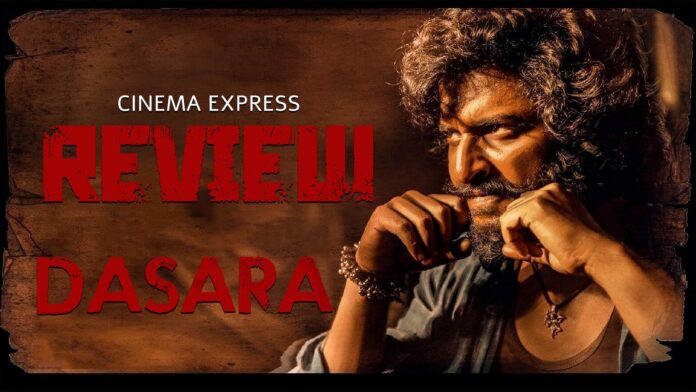The coveted pan-India label is used loosely in Indian cinema, and culturally rooted stories that are infused with larger-than-life heroism seem to be the go-to themes for such films. Nani’s Dasara had the potential to become the next big pan-Indian film originating from the Telugu states. In fact, it starts off as a compendium of multiple pan-India films. Veerlapalli, the hamlet Dasara is set in is abutted by coal mines and the thick layer of black dust everywhere takes you back to the mines of KGF. We see Dharani ( Nani) make a living with his friends by pilfering coal from moving trains, with his parkour jumps reminiscent of the action choreography in Pushpa. At the heart of Dasara is the jigri dosti of Soori (Dheekshith Shetty) and Dharani and there are no points for guessing which recent successful Telugu film comes to mind when we talk of male friendship. However, what makes Dasara a film that truly expands the definitions of what passes off as a pan-India film is director Srikanth Odela’s unique and rousing voice that ensures the film assuredly dodges comparisons. There are a lot of ‘a-ha, I got you!’ moments in the film that makes us smile thinking of how quick we were to judge Dasara as just a byproduct of the successes of a KGF/RRR/Pushpa/Kantara, and not as a highly effective, and deeply engrossing mass entertainer that is its own beast.
Director – Srikanth Odela
Cast – Nani, Keerthy Suresh, Dheekshith Shetty, Shine Tom Chacko
Alcohol is the primary leitmotif of Dasara’s first half, which is used to establish the caste and power dynamics of Veerlapally. We see how the stronghold of Shivanna (a buck-toothed Samuthirakani) shifts to Rajanna (Sai Kumar), creating a ripple effect in the lives of Dharani, Soori, and Vennela (Keerthy Suresh). It is beautiful how Dharani, Soori, and Vennela form a subversive love triangle, which has a refreshing eschewal of jealousy that paves the way for a tender gaze on male vulnerability. Srikanth Odela’s vision finds a perfect match in Nani’s acting prowess, as the actor lays his heart bare in scene after scene to heartbreaking effect. This vulnerability is used as a platform from which the film makes giant strides in the second half where the plot steadily burgeons into mythical proportions, which is kickstarted by a bone-chilling interval banger that injects adrenaline into the proceedings and gives Dasara a new sense of urgency.
Dasara, at its core, is the coming-of-age story of Dharani, who suffers a personal tragedy before taking up the cudgels for a righteous fight. Unlike the usual big-ticket revenge sagas, where rage and violence are de rigueur, Dasara actually makes way for a debate on the necessity of violence. Though the film quickly resumes the originally scheduled plan of bloodshed, it was an interesting detour nonetheless. Srikanth shows glimpses of being a filmmaker who wants to reinvent masala cinema, and he starts off by changing the way the genre generally treats its women. Keerthy Suresh gets a great role, of a woman who goes from being confident and sassy to one coming to grips with a tragedy. Poorna, who plays the role of Chinna Nambi’s wife is an interesting casting choice as she makes an impact despite her limited presence. But the same can’t be said of Shine Tom Chacko, who isn’t supported by the writing, which gives him poorly dubbed, expository lines that only make him less scary with every line.
The place where Dasara truly succeeds is in the makers’ attention to detail. Visuals of hooch and mutton curry, displayed as hallmarks of Telangana culture feature prominently, and the presence of people with dwarfism is a depressing but pertinent detail thrown in to show the congenital issues people living amidst coal mines are susceptible to. It is a world cut from the cloth of reality, of lived experiences and memories finding their way from the script to screen. However, the film does falter a bit with some creative choices, and the discord between writing and editing. Why should a weapon have the visual of a villain superimposed upon it when the film’s strength lies in its subtlety and strong emotions?
What truly is the takeaway from Nani’s Dasara is the voice of a potentially important filmmaker. The pre-interval action sequence and the portions involving Dharani and Vennela’s marriage are resounding proof of Srikanth Odela being the real deal. Of course, there are places where he needs to pick up the slack, especially in the staging of the action sequences among others. But points to Srikanth for developing a core and a narrative that rises above its shortcomings and manages to create a visceral, immersive experience where the sum of the emotions elicited prove to be larger than its moving parts.
#Dasara #Movie #ReviewA #surprising #reimagination #mass #cinema #Cinema #express

